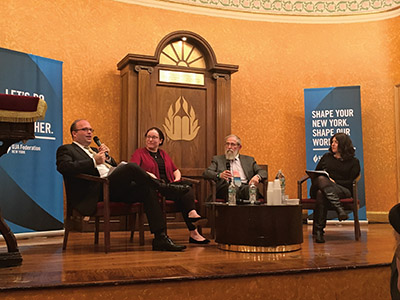
On February 14, the Manhattan Jewish Center was crowded with over 130 people who came out to listen to a panel of prominent Orthodox leaders discuss the topic of social justice in Modern Orthodoxy. Sponsored by UJA Federation of New York and co-chaired by the leaders of Hitoreri: An Orthodox Movement for Social Change, the panel consisted of Rabbi Saul J. Berman, Dr. Elana Stein Hain and Rabbi Elie Weinstock. Over the course of the evening, the three shared their insights and opinions regarding an assortment of related topics. Alexandra Roth-Kahn served as the panel’s moderator. A question-and-answer session with the audience followed the discussion.
Many different topics were discussed by the panel. In addition to intersectionality and human rights, a point that was touched on was whether social justice might lead Modern Orthodox Jews in a more universal direction. Dr. Stein Hain, a lead faculty member at the Shalom Hartman Institute of North America, said, “Universalism is a legitimate fear for a people living as a minority and trying to keep their culture and ethics alive. I hope we keep that fear, but not to the point that it paralyzes us from being able to see outside.”
On the topic of racism in the Orthodox community, the panel unanimously agreed on its existence. “I think we have a fundamental core responsibility to combat [this issue], ” Rabbi Berman, an educator and scholar, said. Having contributed to the civil rights movement as far back as 1965, when he was arrested twice for trying to assist in the voter registration efforts that famously took place in Selma, Alabama, Rabbi Berman said that there is no easy solution to this problem. “It’s a work in progress,” he continued. “[We need to] see past the color of the skin to see the essence of who these people are. But we need to work on that. It won’t happen unless we work on it.” Dr. Stein Hain added to his points, mentioning that her children attend a school where all of their classmates are generally of the same race and socioeconomic background. She argued that the lack of diversity can keep the youth from really creating meaningful bonds with children outside of this bubble. “I think it’s a tough nut to crack,” she explained.
Regarding LGBT activism within the Orthodox Jewish community and trying to reconcile it with Torah values, Rabbi Berman said, “We don’t reconcile them, we learn to live with people despite all of our differences and judgments that they are living in a way that we cannot religiously condone.” Rabbi Weinstock, a rabbi at Congregation Kehilath Jeshurun, shared his own stance on the matter, saying, “The classic Talmudic response is that there aren’t always answers. We continue to struggle with questions. Nothing in our religion, nothing in life, says we can’t balance and live with tension, and I think that it’s more a function of how we’re going to live with people and find a way to get along even if they are living in ways that don’t fit in with the Orthodox presentation of how life is supposed to be.” Rabbi Weinstock went on to share that “there are sorts of expectations of how things should look, but when dealing with reality, reality can be messy, reality can be contradictory. It’s really the responsibility of our community to be responsive and it doesn’t mean that it’s impossible to find a way to co-exist.”
Nava Friedman, an event co-chair, said, “It was really inspiring to hear from Jewish leaders across the Orthodox community. I think the most important part of the night was how we named some of the really challenging issues our community faces, but also talked about how and why we need to overcome them.”
Rebecca Krevat, the other co-chair, echoed her sentiments, saying, “[The panel] said all of the things that I’ve been feeling and know to be true when it comes to Orthodox values and the Orthodox community, both in how they’ve engaged with justice issues in the past and where they could use a little work.” Krevat went on to share her praise for Rabbi Berman, explaining how “listening to him tell his stories, it just contributed to making this event so energizing.” Friedman and Krevat co-founded Hitoreri: An Orthodox Movement for Social Change, which is an initiative working to re-commit the Orthodox community to principles of social justice already embedded in Jewish sources and tradition.
For more information about UJA Federation, visit its website at https://www.ujafedny.org/. For more information about Hitoreri, visit its Facebook page at facebook.com/hitoreri.
By Adam Samuel
Adam Samuel is a journalist from Teaneck. When he isn’t busy reading the news, he divides his time between managing his blog, adamssoapbox.blog, and gradually learning how to play piano.










